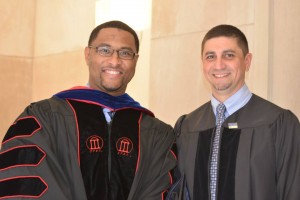Educational leaders are responsible for promoting change, and UConn’s Administrator Preparation Program (UCAPP) students are no exception.
Richard Gonzales, assistant professor-in-residence and director of Educational Leadership Preparation Programs in the Neag School, welcomed guests, including current and future UCAPP students, faculty from the Department of Educational Leadership, and others, to the event. Diane Ullman, UCAPP program advisor, also spoke, touching on the potential power of UCAPP leaders to influence change across Connecticut and the preparation they undergo to lead urban schools. Bob Villanova, director of LEAD CT, discussed change leadership and the ways in which school leaders can foster conditions so that teachers can do the “magic” of high-quality instruction for all students.
The PLUS and Residency students divided into three presentation groups, facilitated by Mike Buckley, associate executive director of the Connecticut Association of Schools; Jen Michno, assistant clinical professor; and Sarah Woulfin, assistant professor. Students presented on the change they had initiated, how they served as the leader for that change, what they learned about leadership, and how they will employ those lessons as school leaders.
Understanding the PLUS and Residency Models
UCAPP PLUS students follow a two-year, urban school leadership model in partnership with Hartford Public Schools (HPS). The goal of this initiative is to feed the HPS leadership pipeline, improving teacher leadership in the short term and raising the caliber of principalship candidates in the long term.
The majority of the members of the first UCAPP PLUS cohort moved into campus- or district-level teacher leadership roles during the two years of the program. These individuals primarily serve as program specialists or intervention specialists who support schools in assisting struggling students. Those who remained at their schools assumed leadership responsibility for special projects, above and beyond their teaching assignments.
The LEAD CT/UCAPP Residency, meanwhile, is a one-year, turnaround school leadership model formed in partnership with LEAD CT, a reform initiative of the Connecticut State Department of Education’s Office of Talent Management. The goal of the Residency is to prepare principalship candidates to lead the schools most in need of immediate improvement, particularly in Connecticut Alliance districts.
Residents of this program are based in districts across the state, including Meriden, New Haven, Hartford, and Vernon. They served during their year in the program as school-level administrators, primarily as assistant principals. In addition to generally supporting the work of the schools, they assumed responsibility for projects in the areas of instructional leadership, organizational leadership, and talent management.
“Well-prepared and fully committed school principals are in demand,” says Villanova, LEAD CT director. “Across the country, school districts are recognizing the need to develop strong internal and external leadership pipelines in order to both prepare and attract strong principals.”
Change Projects
Given UCAPP’s emphasis on data-based decision making in program and/or school improvement, students engaging in these change projects were to identify a data-based need or an opportunity for improvement for which they would attempt to collaboratively lead change. Students’ projects were diverse – from writing a handbook for a secondary school and promoting a positive behavior system to creating a culture of professional learning.
Each student discussed the importance of using multiple forms of data to guide decision making and emphasized the interrelated dimensions of leadership: climate, culture, equity, instruction, and management practices.
While the projects varied in topic and scale, they all ultimately aimed to support of the work of the instructional core – teaching, learning, and curriculum.
“Students from both cohorts seemed to identify issues of inequity where the school was systemically not working well, or adequately, for a particular child or group of students,” says Gonzales.
Students also responded to questions and comments from the audience, which offered them not only the opportunity to practice their formal presentation skills and capacity to speak to a broad constituency, but also to learn from other aspiring principals’ change projects. As part of the program, future UCAPP students will conduct similar Change Project presentations as their culminating activity.
“We are incredibly proud of the graduates of these two inaugural cohorts, who aimed to positively impact the student achievement gap through leadership,” says Gonzales, citing the more than 60 cohorts who have completed the traditional UCAPP program over the past 25 years.
“UCAPP has operated to prepare capable and highly qualified leaders for Connecticut schools,” he says. “We believe [these cohorts] will live up to the high standard of being a UCAPP leader.”
The two inaugural cohorts graduated during UConn’s Graduate Commencement Ceremony on May 9, 2015.

